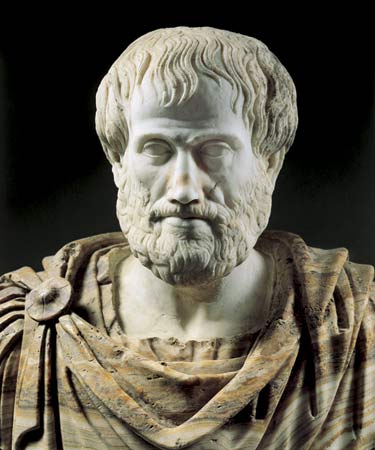
The so-called “logical” works of Aristotle have been grouped together since his first major editor, Andronicus of Rhodes, assembled them in the 1st century B.C. It seems Andronicus – or possibly a later editor – christened these works with the name “Organon” (tool, organ) to suggest that the study of logic should be seen as the great propaedeutic, the unavoidable preparatory instrument one must first master before embarking upon the real world studied by physics, psychology, metaphysics and ethics. Although a significant measure of truth has been granted to this claim, a couple of questions have always troubled its articulation.
One is that the philosopher dedicates so very much time to this supposedly subsidiary instrument. The “Analytics,” his work treating of logical inference proper, is so extensive it came to be presented in two quite large (and quite difficult) works. If you add the other texts of the Organon (the Categories, On Interpretation, the Topics and the Sophistical Refutations – not to mention the Rhetoric and the Poetics, which Arab Aristotelians included, not without reason), you have enough material for a couple of years study, at the very least. Is all this just about a tool?
The second question is even more perplexing. If the Stagirite considered these logical works to be so intrinsically instrumental to his vast philosophical project, why, when we survey his physical, psychological, metaphysical and ethical/political treatises – and even his incomplete Poetics – do we find nary a reference to them? If we are busily building the edifice of philosophy with our metaphorical hammer, saw, screw driver, pliers and all the other tools of a well-stocked toolbox, shouldn’t we catch sight – at least on occasion – of their active and indispensable role in producing the structure? (“Hand me a hammer.” “Now I need the pliers.” etc.) We don’t, and one wonders why.
Some have suggested – rather lamely, in my opinion – that since we only have a fourth, or even just a fifth of all Aristotle wrote, maybe he did make these cross-references in the works that have been lost. However, the best conjecture about those missing works is that they consisted of numerous early dialogues and piles of notes on his incessant zoological researches. His substantive treatises, as imperfect as they sometimes are, seem to have been preserved because they constitute the lion’s share of his mature thought. A better answer to our question is found, I propose, in one of those very treatises. It is in the book which discusses the nature of the intellect (nous), that is, the very faculty that employs logical procedure to begin with. I suggest this text explains not only the inspiration of the title “Organon,” on the one hand, but also gives us insight into why the matter receives such protracted attention at first and then seems to be almost forgotten in the remaining treatises about the real world.
When Aristotle famously defines man as a rational animal, we do well to remember the amplitude of the adjective in Greek: logikon, meaning that we are animals that produce logoi, i.e. discourses. We don’t bark or squeak like some fellow animals (at least not in our finer moments), but we speak, and when we speak we utter various sorts of discourse. Within the womb of the first, inaugural concept we generate – that of being (the most universal, the most fecund but as such the least specific of all concepts) – we produce logoi. These, in turn, go on to specify beings (in the plural), and do so by both signifying ideas and feelings in our souls, and also persons and things outside of us in the world.
Such discourses are mostly approximate in terms of their inferential power (formulated in what Aristotle will call enthymemes, that is, arguments with implicit components). Thereafter, however, may come the dialectical, poetical and sometimes scientific discourses as well. Now, since we evidently perform all these acts, it stands to reason that we must have the power to do so. If you do do something, you can do it. That power, or faculty, is quite simply what we call the nous (translatable as intellect, mind, reason or intelligence).

The book of Aristotle’s I refer to is the De Anima (“On the Soul”), a text on psychology – the science of “souls” in all their forms, powers and acts. In the third book, he arrives at a curious statement when discussing nous. He compares it to the hand. Why? Quite simply because it is with the hand that we “handle” everything, as it is with the nous that we think about everything. Like the mouth and the mind, the hand too is designed with a constitutional openness – but an openness that only exists in order to be closed. As our mouth opens to speak, but (hopefully!) soon closes to listen; or opens to eat, and then (again, hopefully) closes to chew and swallow, our mind seems to exhibit the same pattern. It opens, but only in order to then bite down, as it were, on knowledge.
Aristotle is intrigued by this analogy between the mind and the hand. When not consciously directed, the latter is by nature open and in this way remains poised to grasp virtually any tool that is presented to it. It is relevant here that in our European languages the words we typically use to bespeak understanding and intellectual activity are “manual”; that is, we “grasp” something; we “comprehend” something (from prehendere, in Latin, meaning precisely to grasp). In German, the analogous words are ergreifen, erfassen (both originally meaning to take something into one’s hand). In a sense the hand is the body’s principal tool, but due to its extraordinary versatility, its radical openness and ability to assume a large number of configurations (picking up an apple, turning a screwdriver, wielding a hammer, pushing and pulling a saw, gesticulating, and so on), it would be better, Aristotle suggests, to call it the “tool of tools.”

His point is this: the intellect seems to do in an immaterial way what the hand does in a material way. The mind too “grasps” something; it too is in the service, as it were, of the “tools” it wields (concepts, judgments, arguments, hypotheses, etc.). However, the versatility and adaptability of the material hand is still limited by its very materiality. Although it is indicative, a “sign” of our rational nature (along with the face, as Aristotle asserts), it still cannot do everything.
Nonetheless, it goes quite far, as it can gesticulate eloquently (a talent supremely developed by the Italians, and in almost mind-boggling display in the world of sign language). But even in its first “logical” gesture – that of an infant spontaneously pointing to something outside of it – it also “points interiorly” to the power of the mind behind it. That mind is unmistakably “indicated” by that naturally extended index finger. (see my post on the matter: Pointing)
The nous, as an immaterial power, is potentially able – unlike the material hand – to be entirely versatile and adaptable in relation to the formalities it grasps. In a sense, it can do everything. The hand still has a fixed form (palm, thumb and four fingers); the nous, on the other hand (pun intended), not only is without any material configuration at all, but its immaterial “form” – that is, its natural specification, its function par excellence – is precisely, and paradoxically, to have no form.
It can accept or become all forms precisely because by nature it possesses none. Analogous to clay that is formless so that it can be formed into any shape one chooses, the intellect is formless so that it can receive any knowable form it meets. It is open by nature. This leads to the title of my essay. As a hand which is open to all tools Aristotle calls the “tool of tools,” a “form” that is open to all forms should be called the “form of forms.”
It is this radically open nature of the nous that brings Aristotle to affirm – in one of his more famous and surprising statements – that the intellectual soul is, in a certain sense, all existing things (De Anima, 431b21). Anything and everything that is now, or that ever was, or that ever could be is in principle knowable by an intellect whose very object is, quite simply, being. This excludes nothing which, in any possible way, can be considered to be. Some medieval philosophers called the “spirit” (the intellectual “part”, or center of the soul) the anima animae, the very “soul of the soul.” But that same soul of the rational animal not only besouls the matter of the body (exteriorly), but is itself in turn besouled by its spiritual core (interiorly). Spirit means precisely this radical openness to being.
This “animation” means that it is open to, and quite literally alive to all being, capax universi (“capable of everything,” in the words of Thomas Aquinas). Through it, the soul “becomes all things” in the sense that its immaterial form permits it to be in-formed by any and all reality within its experience. It can become, intentionally (i.e., in an immaterial mode of being that signifies, that thus “tends toward” a reality beyond it) what the things known are in reality (i.e., in the extra-mental world of things).
This would explain why logical studies are considered instrumental, not just in the sense that you need a certain proficiency in them in order to think coherently in the sciences of the real, but also because they study the very intellectual “hand” of the human soul. The Greek word Aristotle uses to say “tool of tools” is the very word the tradition has employed to refer to logic: organon. The hand is the “organon of organons.” The mind, in turn, is the “idea of ideas, or the form of forms.” From applying, analogically, the notion of organon (tool) to that of the “form” of the intellect (its eidon), the further step of calling logical studies a tool is a short one.
That intellectual organ exists only in order to reach out to reality. But its reach is so complex, so rich with articulations (not unlike, and yet so much more than the fingers of a hand), and the discourses it produces so multi-faceted in the ways in which thought can be logikon (“logical”), Aristotle delves deeply and extensively into its world, exploring how it works, and why. He does this by “taking it apart” (the root meaning of the word “analysis”; thus, his name for logic: “analytics”). This is the simple reason he spends so much time with this study, because it is so interesting in itself and so revealing of the way in which nous works.
But there is more. The absence of any conspicuous reference to the logical works in his theoretical or practical scientific treatises is, in fact, evidence of the truly “instrumental” nature of logic. It highlights how this very special instrument – this tool that rises and soars above us as astronomically as does the hurled bone in that iconic scene in 2001: Space Odyssey – lives in the immaterial world of knowing. The concepts, the judgments, the syllogisms and all the rest of our intentional cognitive software – unlike the wooden and metallic density of a carpenter’s tools – are intentional realities, existing only in and of the mind. The scholastics called them “intentions,” insofar as they “intend,” that is, refer either directly to the realities beyond them (as do “first intentions,” especially concepts), or, in the case of the so-called “predicables” (genus, difference, species, pure accident and property) point rather to the ways in which beings exist in the mind, once they are known, and only insofar as they are known (sometimes called “second intentions,” the proper subject matter of logic).
Now, to the extent that we are thinking coherently, and allowing the realities we encounter in sensation to enter into and temper our cognitive faculties, these “intentions” have a tendency to function invisibly. They are transparent to the realities to which they provide access, like the lenses in a pair of glasses, or the pane of glass in your living room window. You look through them and not at them. It is only when the lenses crack, or a rock sails through your window pane, or when things simply get dirty, that you pay any attention to the glass. Likewise, it is only when thinking goes awry, or becomes uncertain of itself, that we need to reach deeply into the toolbox of logic. In the same way, we only call the carpenter who built the house to come back for an additional visit when the house needs repairs. As it turns out, Aristotle’s substantive treatises about reality are rarely in need of such repairs.



